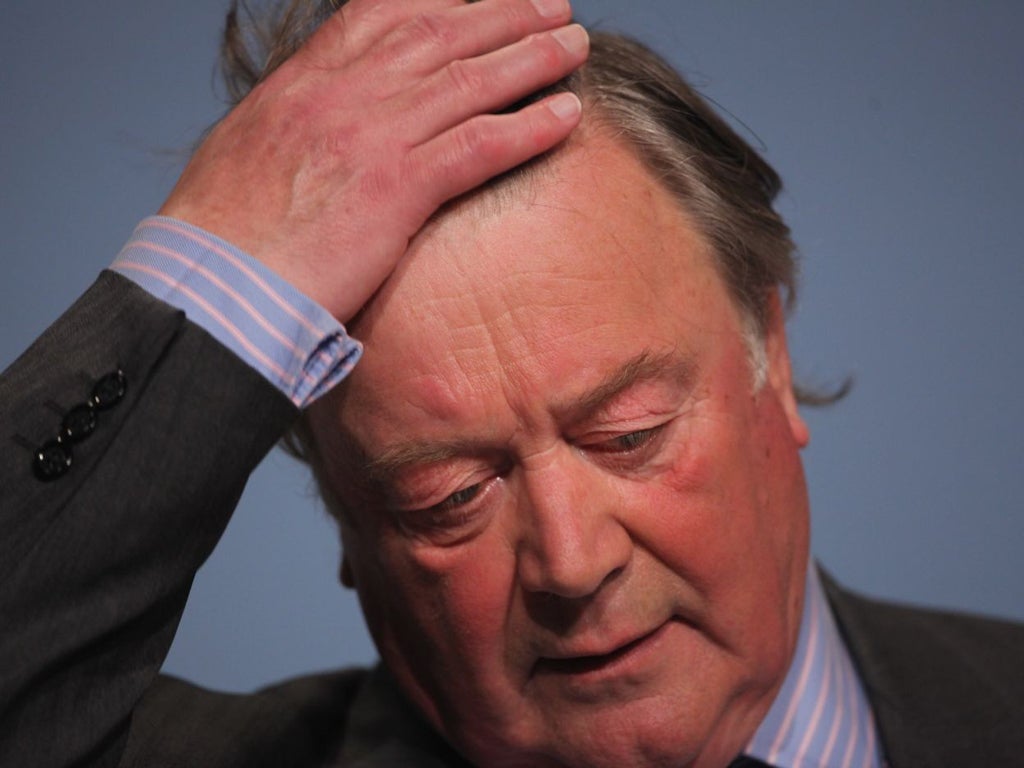'Big beast' Ken Clarke faces downgrade in Cabinet reshuffle

Your support helps us to tell the story
From reproductive rights to climate change to Big Tech, The Independent is on the ground when the story is developing. Whether it's investigating the financials of Elon Musk's pro-Trump PAC or producing our latest documentary, 'The A Word', which shines a light on the American women fighting for reproductive rights, we know how important it is to parse out the facts from the messaging.
At such a critical moment in US history, we need reporters on the ground. Your donation allows us to keep sending journalists to speak to both sides of the story.
The Independent is trusted by Americans across the entire political spectrum. And unlike many other quality news outlets, we choose not to lock Americans out of our reporting and analysis with paywalls. We believe quality journalism should be available to everyone, paid for by those who can afford it.
Your support makes all the difference.Tory Big Beast Ken Clarke is being downgraded after causing a series of headaches for his party's leadership.
The 72-year-old Nottinghamshire miner's son was brought back from the political wilderness two years ago to give the coalition Government some much-needed heavyweight experience at a time of economic crisis.
But instead he managed to make headlines for all the wrong reasons, clashing with Home Secretary Theresa May and becoming the focus of a campaign to axe him for appearing to be soft on crime.
He has been an MP for more than 40 years, first serving his constituency when his now-party leader was just a four-year-old boy.
Since then, he has served as health secretary, education secretary and home secretary, earning a reputation for being tough-talking and quick-witted.
But as Justice Secretary he sparked fury in May last year for suggesting some rapes were not as serious as others.
He was also forced to scrap plans to halve sentences for offenders who pleaded guilty early when the public furore led to David Cameron stepping in to rule out any change in the position.
The seasoned political operator's string of indiscreet comments about Conservative colleague Mrs May pushed him back into the political spotlight last October.
He admitted he rather regretted his use of colourful language after he attacked Mrs May's use of "laughable and childlike" examples to criticise the Human Rights Act after she claimed an illegal immigrant escaped being deported because he had a pet cat.
The spat dominated much of the Conservative Party conference last year.
Further controversies followed, with Mr Clarke dropping plans to abolish the post of chief coroner last November amid heavy opposition from the Royal British Legion.
His legal aid reforms also left campaigners angry, leading to a number of concessions to make it easier for victims of domestic violence to claim legal aid.
And in May, Mr Clarke's Justice and Security Bill created controversial new rules to hear evidence in secret in civil court cases where national security is a factor.
Many put his indifferent attitude to causing uproar down to the fact he had nothing to lose as he knew it would be his last big job in government.
He has been an MP since 1970, but it was not until 1988 that he was promoted to the cabinet.
Taking the reins as chancellor in 1993 after former leader John Major forced Norman Lamont to quit in the wake of Black Wednesday, he presided over a period that saw interest rates, inflation and unemployment all falling.
When the Conservative government fell in 1997 Mr Clarke was one of the first to enter the race to become the new leader - the first of three failed attempts to take the helm of the party.
His affable nature combined with his love of beer and sport have made him an often popular figure with the public, but his more liberal views on crime and strident pro-European stance have made him unpopular with many in the party.
He has also attracted controversy for his business interests, including a highly paid vice-chairmanship of British American Tobacco.
Known for his love of jazz, cigars, classic cars and Hush Puppy shoes, he is also a cricket and football enthusiast and a fervent supporter of Nottingham Forest.
The MP for Rushcliffe became a Conservative at Cambridge, where he was president of the Union in 1963. While there he met his wife Gill, a director of Oxfam.
PA
Join our commenting forum
Join thought-provoking conversations, follow other Independent readers and see their replies
Comments